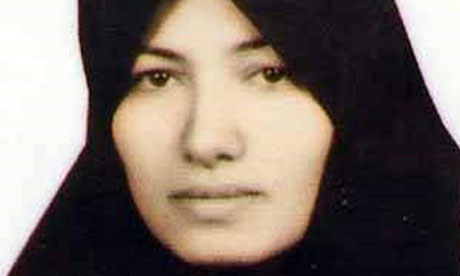Iran imposes media blackout over stoning sentence woman
Sakineh Mohammadi Ashtiani will not be stoned, the regime has said, but family fear she will be hanged instead

Iran has imposed a media blackout over the case of a 43-year-old mother of two who was sentenced to be stoned to death and whose fate is still unclear despite an apparent "reprieve".
Sakineh Mohammadi Ashtiani is still facing execution by hanging after being convicted of adultery, her son told the Guardian today.
Newspapers, agencies and TV channels in Iran have been banned from reporting Mohammadi Ashtiani's death sentence, despite an international campaign launched by her children, which has been joined by politicians and celebrities from all over the world.
The campaign, first highlighted by the Guardian last week, has failed to stop the Iranian authorities from pressing ahead.
Last night the Iranian embassy in London issued an opaque statement saying that Mohammadi Ashtiani would not be stoned to death. "According to information from the relevant judicial authorities in Iran, she will not be executed by stoning punishment," it said.
The statement was not reported inside Iran and neither was the news of stoning death sentences for 15 other Iranians.
"It's not the first time we are banned from reporting a stoning case, but because of the sensitivity over Sakineh's case the censorship for her story is even stricter," said an Iranian journalist from Tehran who asked not to be named.
"We are banned from reporting any details about her case. If they think that it [stoning to death] is an Islamic rule, why are they afraid of it so much? I think that the statement issued by Iran's embassy in London is just to calm down the situation. Once the outrage has cooled off, they might hang Sakineh instead."
Iran has not stoned a woman to death since 2007 when the execution of Mahboubeh M sparked outcry in Iran. She had been forced to confess to adultery.
"They told her that they'll pour boiling water on her head if she refuses to confess that she had sex with another man except her husband," said Soheila Vahdati, a human rights activist in California. "They executed her in secret and we were all informed when her death sentence was completed."
Mahboubeh's story became known only when an official witness of her death revealed that she had been buried alive up to her shoulders while the guards stoned her to death.
A number of men have been stoned to death in recent years.
Mohammadi Ashtiani's son, Sajad, 22, who began the campaign to save her, said the embassy's statement has not stopped him worrying for his mother. "They just said that she won't be stoned, it doesn't mean that she won't be executed. She's still on death row."
A prisoner reprieved before stoning may be hanged, as was the case for Abdollah Farivar in 2008. Farivar, convicted of "illicit relationship outside marriage", was initially sentenced to death by stoning but later hanged when a campaign for his case attracted worldwide attention

Iran has imposed a media blackout over the case of a 43-year-old mother of two who was sentenced to be stoned to death and whose fate is still unclear despite an apparent "reprieve".
Sakineh Mohammadi Ashtiani is still facing execution by hanging after being convicted of adultery, her son told the Guardian today.
Newspapers, agencies and TV channels in Iran have been banned from reporting Mohammadi Ashtiani's death sentence, despite an international campaign launched by her children, which has been joined by politicians and celebrities from all over the world.
The campaign, first highlighted by the Guardian last week, has failed to stop the Iranian authorities from pressing ahead.
Last night the Iranian embassy in London issued an opaque statement saying that Mohammadi Ashtiani would not be stoned to death. "According to information from the relevant judicial authorities in Iran, she will not be executed by stoning punishment," it said.
The statement was not reported inside Iran and neither was the news of stoning death sentences for 15 other Iranians.
"It's not the first time we are banned from reporting a stoning case, but because of the sensitivity over Sakineh's case the censorship for her story is even stricter," said an Iranian journalist from Tehran who asked not to be named.
"We are banned from reporting any details about her case. If they think that it [stoning to death] is an Islamic rule, why are they afraid of it so much? I think that the statement issued by Iran's embassy in London is just to calm down the situation. Once the outrage has cooled off, they might hang Sakineh instead."
Iran has not stoned a woman to death since 2007 when the execution of Mahboubeh M sparked outcry in Iran. She had been forced to confess to adultery.
"They told her that they'll pour boiling water on her head if she refuses to confess that she had sex with another man except her husband," said Soheila Vahdati, a human rights activist in California. "They executed her in secret and we were all informed when her death sentence was completed."
Mahboubeh's story became known only when an official witness of her death revealed that she had been buried alive up to her shoulders while the guards stoned her to death.
A number of men have been stoned to death in recent years.
Mohammadi Ashtiani's son, Sajad, 22, who began the campaign to save her, said the embassy's statement has not stopped him worrying for his mother. "They just said that she won't be stoned, it doesn't mean that she won't be executed. She's still on death row."
A prisoner reprieved before stoning may be hanged, as was the case for Abdollah Farivar in 2008. Farivar, convicted of "illicit relationship outside marriage", was initially sentenced to death by stoning but later hanged when a campaign for his case attracted worldwide attention.

No comments:
Post a Comment